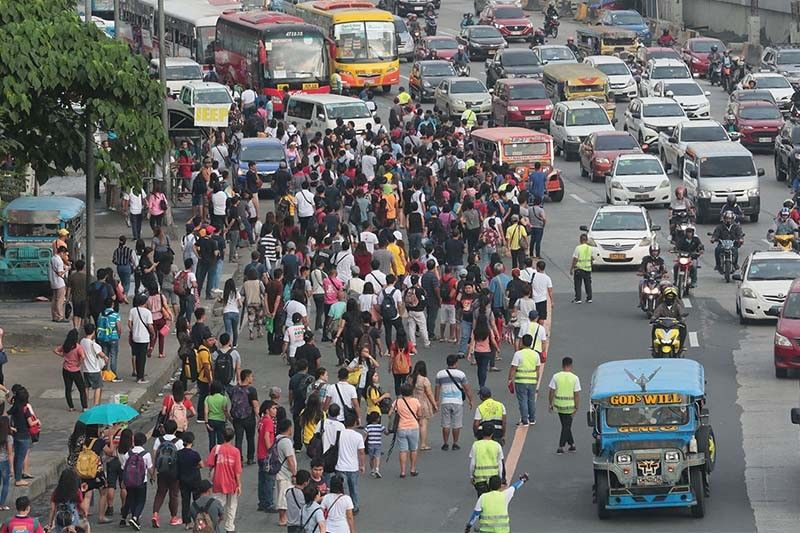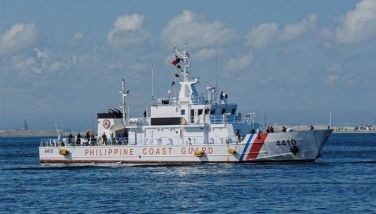Inconvenience not the goal of transport strike, MMDA spokesperson told

MANILA, Philippines— (Updated Oct. 1, 9:19 a.m.) Bagong Alyansang Makabayan secretary-general Renato Reyes on Monday criticized Metro Manila Development spokesperson Celine Pialago for saying the nationwide transport strike was “unsuccessful.”
Pialago was quoted in a News5 report as saying that the transport groups who went on strike were not successful because the situation in the areas where passengers got stranded has normalized around 8:30 a.m.
“So for us you can’t consider that as this transport strike paralyzed the remaining passengers who are about to go to other offices or work because though some suspended their classes and work, that’s for the convenience because we don’t want to take risk with that transport strike,” Pialago said in a separate interview with ANC.
“For us putting these commuters into that inconvenience is not successful. That’s selfishness,” she added.
'Temporary disruption is a last resort'
Reyes, however, said that the strike was not held as a way to inconvenience the public.
The major transport operators and drivers scheduled the nationwide transport strike to protest the government’s plan to phase out jeepneys and the UV Express service, 15 years and older.
"A strike aims to disrupt in order to call attention to an issue. The fact na nagsuspinde ng pasok, dahil may disruption, ito ay tagumpay na ng transport groups. Hindi ata nauunawaan ng MMDA ang layunin ng isang strike," Reyes said in a tweet.
(A strike aims to disrupt in order to call attention to an issue. The fact that there were suspensions of classes and work, because of the disruption, this is a success of the transport groups. The MMDA probably does not understand the vision of the strike)
"The temporary disruption is a last resort in order to raise just demands. May ipinaglalaban po ang mga tsuper. Hindi lamang po ito pamemerwisyo.Hindi lang po ito pamemerwisyo. May ipinaglalaban po ang mga tsuper. Para makamit ito, magsasakripisyo sila na hindi kumita sa loob ng isang araw. Ganun po ang strike. May kaakibat na malaking sakripisyo yung nagwe-welga,” he added.
(The temporary disruption is a last resort in order to raise just demands. The drivers are fighting for something. It’s not just about inconvenience. The drivers are fighting for something. To achieve this, they are sacrificing their income for the day. That’s what the strike is about. There is a sacrifice in exchange of protest)
Several local government units suspended classes in their respective jurisdictions on Monday in anticipation of the strike.
The MMDA and some local governments offered free rides to assist commuters affected by the strike.
Who joined the strike?
The Tigil Pasada strike was organized by the Alyansa Kontra PUV (public utility vehicle) Phase Out.
The group consists of Pinagkaisang Samahan ng mga Tsuper at Operators Nationwide (PISTON), Stop and Go Transport Coalition, Alliance of Concerned Transport Organization (ACTO), Samahan ng mga Tsuper at Operator Tutol sa Phase Out (STOP) of Central Luzon, Federation of UV Express of Luzon (FUEL), No To Jeepney Phaseout Coalition (NTJPOC), and the Marikina Transport Council.
These organizations, along with individual drivers and operators, comprise the estimated thousands of participants in the strike.
Commuters were also invited to join the strike in support of the organizers’ cause.Protesters converged at numerous meeting points across the country, including the National Capital Region, Bulacan, Dagupan City, Cauayan City, Santiago City, Baguio City, San Fernando, Cavite, Legazpi City, Laguna, Lipa City, Capiz, Iloilo City, Bacolod City, Cebu City, and Gensan.
NCR hosts the bulk of strikers with nine protest centers, including the Welcome Rotonda and the Monumento Circle.
Why are they striking?
The main purpose of the strike is to resist the implementation of the Public Utility Vehicle Modernization Program in July 2020.Dubbed the "Pahirap Program" by transport groups, the PUVMP is a program of the Department of Transportation and the Land Transportation Franchising and Regulatory Board (DOTr-LTFRB) provided in Department Order 2017-011 and LTFRB Memorandum Circular (MC) 2019-013.
Strikers allege that the PUVMP will drown small-scale PUV operators in debt, threatening the livelihood of drivers dependent on public utility jeepneys (PUJ) and UV Express vehicles.Under LFTRB MC No. 2019-013, all UV Express vehicles must be replaced with Class 3 types, regardless of make and condition.
Class 3 units, which can carry at least 23 passengers and have front-facing seats, are valued at P2.3 million to P2.6 million per unit, compared to only about P595,000 needed for jeepney rehabilitation noted by Stop and Go Transport Coalition.
According to Stop and Go Transport Coalition, the rehabilitated jeepney model passed the requirements set by DOTr but was rejected nonetheless.
PISTON president emeritus George San Mateo has called for the junking of DOTr Department Order 2017-011, or the Omnibus Franchising Guidelines and its implementing guidelines under LTFRB Memo Circular 2019-013, which set the deadline of “Total Jeepney/PUV phase-out, Jeepney Scrappage, Franchise Consolidation, Corporate Capture [and] Corporate Monopoly” by the end of June 2020.
Transports groups also resist the consolidation of franchises sought by LTFRB, a move they claim will corporatize the current PUV setup and further threaten the livelihood of drivers and operators.
What are the strikers calling for?
The organizers of the strike have made clear that they are not against the modernization of public transport. Rather, they are only calling for modernization through repair, rehabilitation, and upgrading current PUVs. — with Philstar.com/Ratziel San Juan
(Editor's note: An earlier version of this article identified Reyes as secretary-general of Bayan Muna party-list. Reyes is secretary-general of Bagong Alyansang Makabayan, or Bayan. This has been corrected)
- Latest
- Trending


























